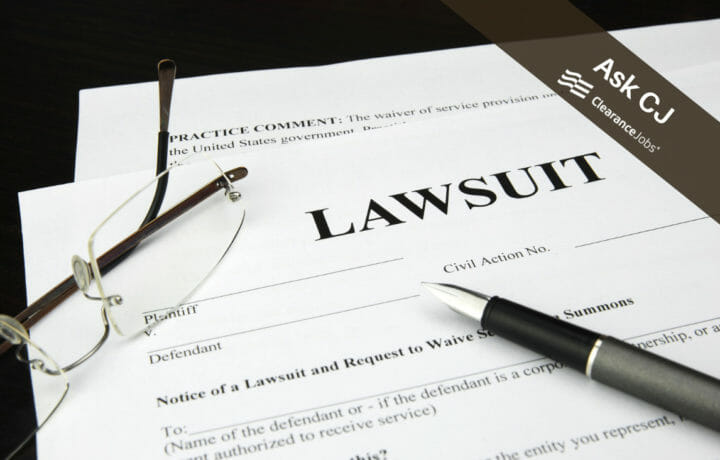ClearanceJobsBlog, receives many questions about the security clearance process, including this one: Can you sue the federal government? Here’s the quick response: yes, it is possible to sue the government. However, you might not be surprised to learn that the full explanation is longer and more complex… and probably better suited for a security clearance attorney:
Long story short, back in 2023 I was working for a three-letter agency and had been for the previous 8 years. I was called into my site lead’s office and told that “my clearance was suspended” and I was escorted out. I asked why and was told “we don’t know, the government just called down and said you were suspended pending investigation”. To this day I have still never been given a reason for why this happened. I NEVER received an SOR, and never had a chance to defend myself, and I was terminated 2 months later. I was out of work for 7 months because I was told my clearance was suspended. Any attempt to find out what happened was met with dismissiveness and even threats. Eventually I just applied to jobs that required a clearance and lo and behold…my clearance was not suspended. It was very much active, and I started working again using my clearance that was “suspended”. From what I have read you can sue if there was a due process violation, which was the case since I never received an SOR, never had a chance for a rebuttal, and was caused a hardship by losing my job. Could I sue? And even if I did sue, who would I sue? And would this affect my current clearance in any way?
Can you sue? Sure.. Can you expect anything to come out of it (aside from stress and huge legal fees)? Only time will tell.
Bill Henderson, ClearanceJobs contributor notes, “There is a provision in the Directive (E3.1.42 through E3.1.46) for reimbursing applicant for lost wages. It’s for wrongful clearance denials, revocations and suspension.”
E3.1.42. An applicant may file a written petition, under oath or affirmation, for reimbursement of loss of earnings resulting from the suspension, revocation, or denial of his or her security clearance. The petition for reimbursement must include as an attachment the favorable clearance decision and documentation supporting the reimbursement claim. The Director, DOHA, or designee, may in his or her discretion require additional information from the petitioner.
Next steps would be to gather any and all documentation that you can and consult an attorney – and discuss the possibility that this was more of your former company’s doing more than the government agency.
Much about the clearance process resembles the Pirate’s Code: “more what you’d call guidelines than actual rules.” This case-by-case system is meant to consider the whole person, increase process security, and allow the lowest-risk/highest-need candidates to complete the process. This article is intended as general information only and should not be construed as legal advice. Consult an attorney regarding your specific situation.




